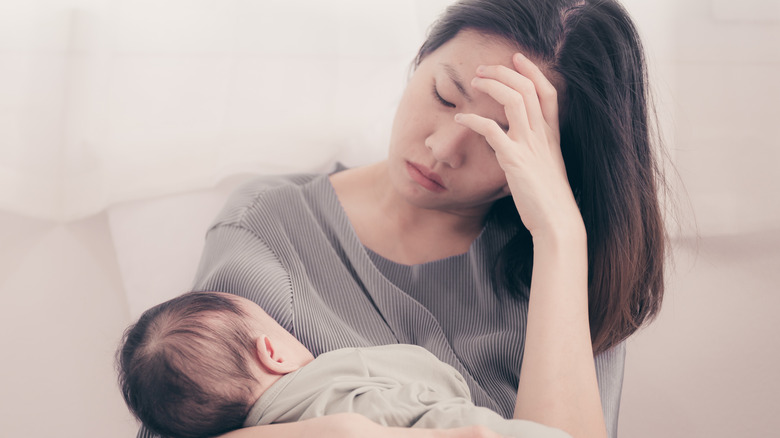Giving birth and embarking on motherhood is often described as a magical journey. But it can also be deeply vulnerable and fraught with emotions, especially if you’re one of the millions of new mothers facing the challenges of postpartum depression. Approximately 75% of new moms grapple with the “baby blues” after giving birth, and up to 15% of these women tumble into postpartum depression, a more severe and longer-lasting depression (via International Journal of Women’s Health).
Postpartum depression — sometimes referred to as peripartum depression — affects women from all demographic and cultural backgrounds (via Expert Opinion on Pharmacotherapy). The highest risk of onset is said to be during the first month after delivery. But the reality is that depression can set in at any time within the first year postpartum, and symptoms may continue to crop up for several years after that (via Translational Psychiatry). The condition unravels in different ways for different individuals. It typically involves a sudden shift in emotions and physical wellbeing, as well as changes in eating patterns and sleep habits. Mothers may have difficulty raising their babies while buckling under the stress of new demands and responsibilities.
Rates and severity of postpartum depression have skyrocketed since the onset of the COVID-19 pandemic, notes a 2024 study from PLoS One, with many women reporting elevated levels of depression, anxiety, loneliness, and posttraumatic stress. Read on to find out more about postpartum depression including some possible causes, symptoms, and treatment options.
The increased vulnerability of women with a history of depression
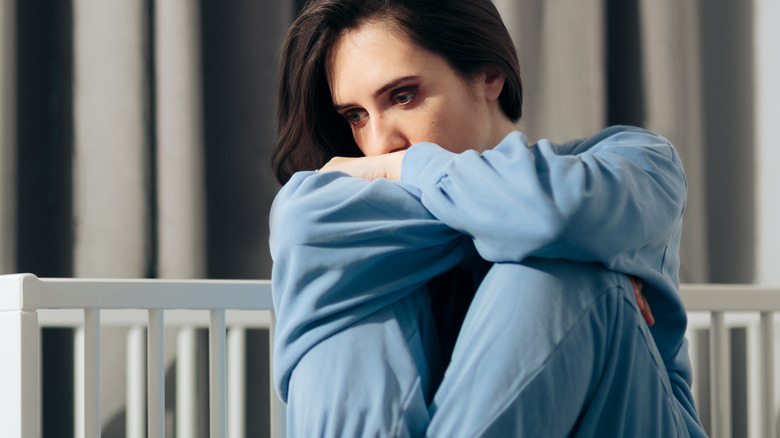
Postpartum depression has multiple and interconnected causes (via Annual Review of Clinical Psychology). This multifactorial disorder is perhaps best explained by a combination of physical, psychological, and environmental changes. Some of the main risk factors include lack of social support, high life stress, and marital or relationship dissatisfaction, according to a 2024 review study from the Journal of Midwifery & Women’s Health, with the two strongest predictors being prenatal depression and current abuse.
Women experiencing domestic violence are almost thrice more likely to struggle with depression than their counterparts, details a 2024 study in Translational Psychiatry. Even past experience of abuse from one’s partner or family serves as a risk factor. “Mothers who are abused experience feelings of helplessness and despair, as well being at high risk to commit suicide,” state the authors.
Unsurprisingly, the risk of postpartum depression has been found to be higher among women with a history of mental health difficulties like depression, anxiety, and mood disorders (via Journal of Midwifery & Women’s Health). Mothers who were previously diagnosed with depression are 20 times more likely to develop postpartum depression than women with no prior clinical diagnosis, revealed a 2024 study from the journal Depression & Anxiety. Needless to say, women of all backgrounds and walks of life can find themselves facing a wide spectrum of unexpected and challenging emotions in the wake of becoming a mother.
If you or someone you know is dealing with domestic abuse, you can call the National Domestic Violence Hotline at 1−800−799−7233. You can also find more information, resources, and support at their website.
Post-pregnancy hormones are a culprit
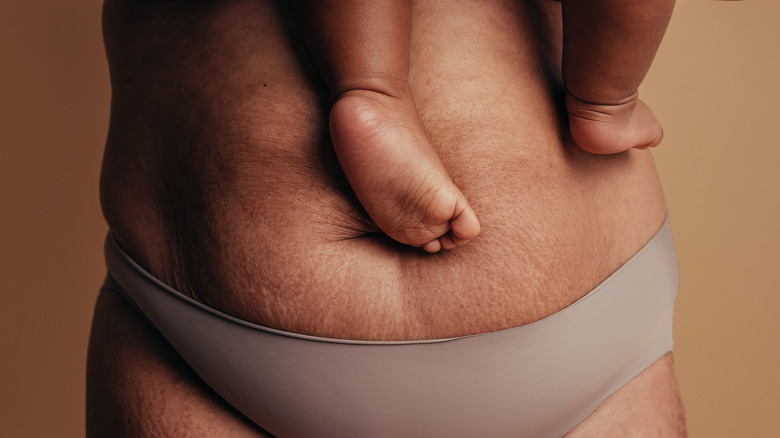
It’s believed that hormones are the main driver of postpartum depression. A woman’s reproductive hormones — estrogen and progesterone — shoot through the roof during pregnancy (via Cell). There’s also a sharp increase in allopregnanolone, a steroid that activates the brain’s receptors for GABA, an inhibitory neurotransmitter that has a calming and anesthetizing effect. The spike in allopregnanolone causes GABA receptors to become inactive during pregnancy so as not to induce sedation. Within one to two weeks of giving birth, a woman’s elevated hormones plummet back down to normal levels, and GABA receptors normalize, triggering a series of changes around the body (via Annual Review of Clinical Psychology). Some researchers hypothesize that a delay in the reactivation of GABA receptors for some mothers alongside the dramatic decline in allopregnanolone might be at the root of postpartum depression (via Neurobiology of Stress).
In breastfeeding women, the milk hormone prolactin remains high, explain the researchers from the Annual Review of Clinical Psychology. Prolactin has been shown to have “stress-buffering effects,” which could serve as one possible explanation for why women who breastfeed are less susceptible to depression. More research is needed to really pin down the relationship between specific post-pregnancy hormones and depression.
The impact of psychosocial changes

Christinarosepix/Shutterstock
A woman may encounter various new stressors after giving birth: little time to herself, lack of sleep, the physical and emotional demands of caring for a new baby. All of these drive up her chances of developing depression (via Annual Review of Clinical Psychology). Some consistent predictors of postpartum depression include perceived stress, namely the feeling of being unable to cope, and chronic strains like financial worries and work demands. Stressful life events can certainly be a breaking point for some women. There are a number of social changes that come along with having a baby that can give rise to depressive symptoms, notes a 2024 study. Lack of support from one’s partner, family, or social network are often cited as key contributors to postpartum depression. And many women struggling with the disorder allude to feeling isolated and alone.
It can be difficult for some women to accept the transition to motherhood and adjust to a new maternal identity (via Journal of Advanced Nursing). Researchers have found that a loss of time and autonomy often precedes the sense of being out of control and feeling trapped. New moms don’t have the same amount of time as they once did to attend to their own needs, which can lead to a “loss of former identity.” In addition to talking to a healthcare professional like your doctor, it can be helpful to avoid excessively reading parenting information from potentially unreliable sources, recommends Pregnancy, Birth and Baby.
The role that culture plays
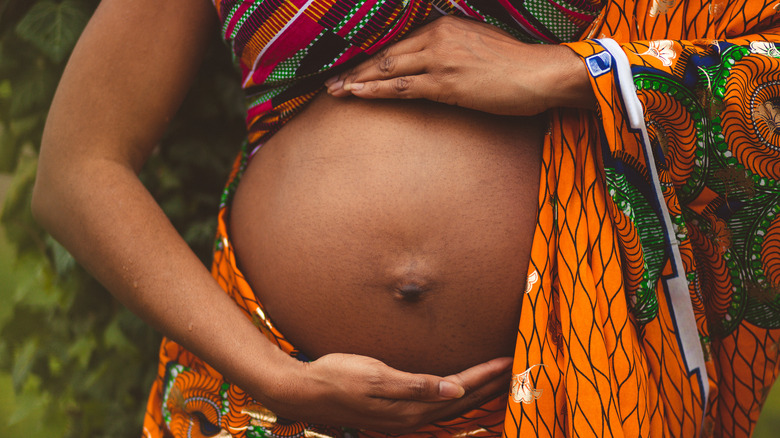
Liderina/Shutterstock
The researchers of a study published in Current Directions in Psychological Science described postpartum depression as a “disease of civilization.” They point out that a heightened risk of the condition is associated with some notable changes in motherhood over the past century, such as early weaning and nutritional deficiencies, lack of sun exposure and physical activity, and isolation from support networks — all of which are now more prevalent than ever. In some countries, where men are close to their mothers, a woman’s mother-in-law plays an important role in both her mental health postpartum and her relationship with her partner. Having a negative relationship with one’s mother-in-law can lead to depression (via Translational Psychiatry).
A 2024 systematic review of 80 different countries discovered that one out of every five women are affected by postpartum depression, and this is largely dependent on income and geographic development. Another review involving 40 countries found that prevalence rates range from almost zero to around 60% (via Journal of Affective Disorders). The authors suggest that this broad continuum can be partially explained by cultural factors like varied definitions and expressions of the condition as well as socioeconomic class, poverty, and different attitudes towards mental health. Cultural norms around childbearing, motherhood, and family structure may also factor into the prevalence of postpartum depression. For instance, rates are much lower in countries where mothers receive greater support from family and friends in the first few months of giving birth.
The possible link between breast-feeding and postpartum depression

Nastyaofly/Shutterstock
There’s been a fair amount of research highlighting the link between breastfeeding and depression. A 2024 study published in the journal Public Health Nursing found that women who breastfed were much less likely to struggle with postpartum depression than women who weren’t breastfeeding. The researchers also discovered an inverse relationship between breastfeeding length and depressive symptoms: The longer that women breastfed, the more they lowered their risk of postpartum depression. Breastfeeding may be a “cost-efficient and healthy behavior that can decrease a woman’s risk for postpartum depression” concluded the study authors. Another study showed that women who were breastfeeding at 5 months postpartum had much fewer depressive symptoms compared to those who were formula feeding.
It’s been suggested that postpartum depression might be tied to the emotional and psychological effects of breastfeeding. A study published in Obstetrics & Gynecology highlighted that women who had negative nursing experiences and reported severe pain while breastfeeding were more prone to depression. Based on the findings of another study from Maternal and Child Health Journal, the impact of breastfeeding on a woman’s mental health may ultimately depend on her intentions: Women who planned to breastfeed but were unable to were at a much greater risk of depression than women who had no such intentions. Needless to say, the “direction and precise nature” of the relationship between breastfeeding and postpartum depression remain unclear and need further research (via Depression Research and Treatment).
The genetic factors behind postpartum depression
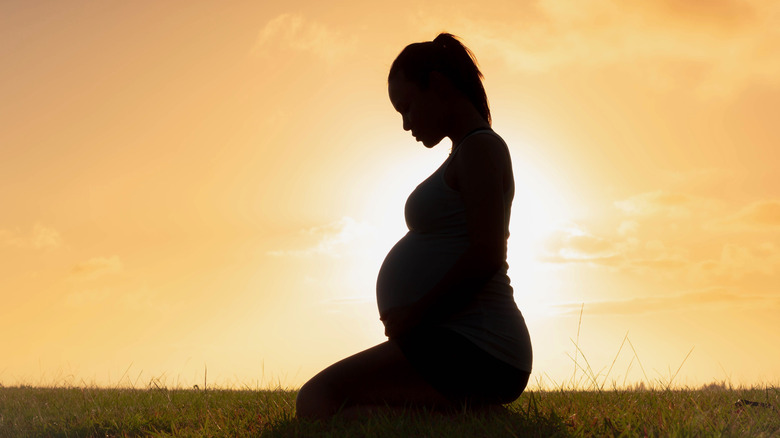
Christinarosepix/Shutterstock
The research investigating the genetic influence in postpartum depression remains sparse (via World Journal of Psychiatry). Many researchers argue that our current knowledge of the genetic basis of postpartum depression is limited and needs further investigation. But there’s certainly some evidence that the condition can run in families and that some women are more prone to developing postpartum depression due to genetic factors.
A study from the American Journal of Psychiatry looked at 45 pairs of sisters with unipolar depression. The results showed that when one sister met the diagnostic criteria for postpartum depression according to the DSM-IV, 42% of the other sisters also struggled with the condition after having a baby, whereas only 15% of women with no family history of depression experienced postpartum depression. The influence of genes was even more pronounced when the researchers confined their analysis to the onset of depression occurring between six and eight weeks postpartum. Another twin study from the journal Psychological Medicine estimated that the heritability of postpartum depression was 25%. Most researchers and clinicians concede that postpartum depression, like other psychiatric disorders, is probably born out of an interaction between biological and psychosocial risk factors. It’s been hypothesized that stressful life situations may trigger postpartum depression and anxiety in women with genetic, hormonal, and cognitive vulnerabilities.
Neuroinflammatory mechanisms underlying postpartum depression
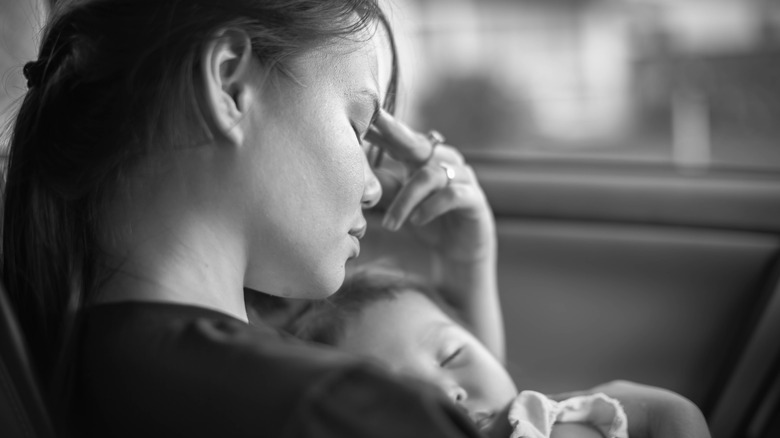
Christinarosepix/Shutterstock
The tsunami of hormones sweeping through a woman’s body during and after pregnancy is often considered to be the main culprit behind postpartum depression. But emerging research is challenging this longstanding theory. A 2024 study presented at the annual Society for Neuroscience meeting suggests that the mood disturbances occurring in the aftermath of giving birth might be due to immunological factors, in particular, abnormal immune system activity triggered by postpartum stress. Stress exposure has long been known to spark inflammation in the body and cause the immune system to be on high alert, creating imbalances that compromise your physical wellbeing. The researchers looked at the medial prefrontal cortex, the area of the brain that’s responsible for mood regulation, and found that the neurons and their environment became inflamed when the individual was faced with stressful situations.
The idea that pregnancy-related inflammation can put postpartum women at a unique risk of depression is reinforced by evidence that dynamic changes occur in the immune system during pregnancy and at delivery, which can give way to psychiatric problems. Women with postpartum depression exhibit high levels of inflammatory biomarkers, based on the findings of a 2024 study from the Journal of Neuroscience Research. Thus, the authors believe that it’s completely plausible that a “compromised adaptability of the immune system” may account for postpartum depression.
Symptoms can be hard to detect

Christinarosepix/Shutterstock
Postpartum depression doesn’t neatly fit into a single category. Each woman is affected differently, which can make the condition hard to detect. Symptoms can include “desperation, sadness, nausea, changes in sleep and eating habits, decreased libido, crying spells, anxiety, irritability, feelings of isolation, mental liability, thoughts of hurting oneself and/or the infant, and even thoughts of suicide,” reports a 2024 study. And nearly two-thirds of women struggling with postpartum depression encounter some form of anxiety disorder (via JAMA Psychiatry).
For the majority of women, “postpartum blues” is a mild, transient mood tinged with sadness (via International Journal of Women’s Health). Some women feel desolate and despondent. One in 1000 women have a more severe experience called postpartum psychosis, which usually occurs within the first two to four weeks after delivery (via Journal of Women’s Health). This can include paranoia, delusions, hallucinations, and severe mood swings, and in most cases, requires emergency medical attention due to an increased risk of self-harm or harm to the baby.
According to the diagnostic criteria of DSM-5, postpartum depression is defined as occurring within the first year after a woman has had her baby (via Journal of Midwifery & Women’s Health). But in reality, both the vulnerability to the illness and depressive symptoms can persist for more than a year postpartum. In fact, a 2024 study found that one out of four new moms deals with severe depression at some point in the three years after giving birth.
Postpartum depression can also affect men
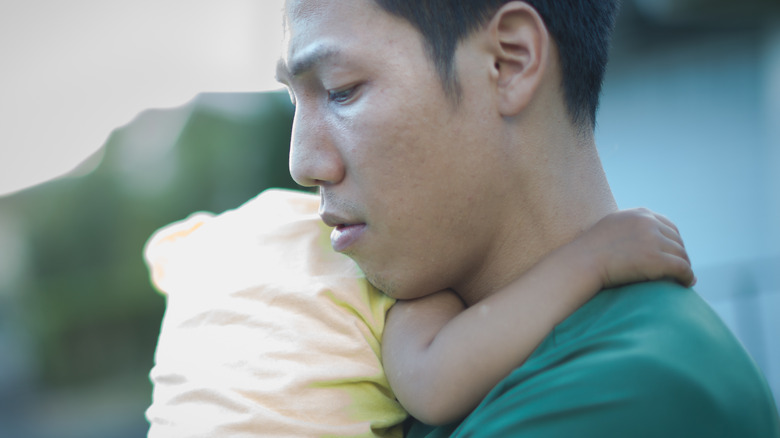
Christinarosepix/Shutterstock
Some people are surprised to discover that men aren’t immune to postpartum depression. The idea that new fathers can face depression is a fairly new, albeit real, phenomenon. In fact, the condition shows up in about 10% of new fathers, usually within three to six months postpartum, but symptoms can sprout throughout the year (via Innovations in Clinical Neuroscience). A study from the Journal of the American Medical Association reported that men are likely to battle depression somewhere between the first trimester of their partner’s pregnancy to six months postpartum, and the prevalence rate rises to 26% during the first three to six months of their child being born.
If one parent has depression, it’s much more likely that the other will start to experience depressive symptoms too, notes a 2024 study published in Midwifery. The authors shed light on the impact of sleep disturbances and deprivation on the physical and emotional wellbeing of new parents, demonstrating that poor sleep is both a predictor and an outcome of depression. Fatigue among fathers is a particularly potent contributor towards depression after childbirth, and it can often lead to relationship problems, poorer safety compliance at work, and a decline in mental health, generally increasing as the infant gets older.
The cost of stigma
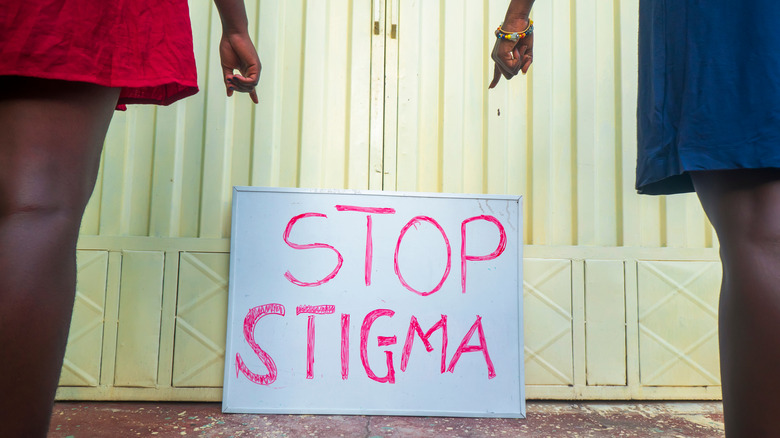
Yaw Niel/Shutterstock
Stigma is a destructive phenomenon that can exacerbate symptoms of postpartum depression. A widely-held perception is that motherhood is meant to be a sacred and joyful experience, but it also can be a mixed bag of emotions ranging from ambivalence to trepidation to outright panic. The conflict between the inherent connection that new mothers think they should feel and the reality of the depression they actually experience can be confusing, evoking a deep sense of guilt and shame for a lot of women (via Campbell Systematic Reviews).
It’s often reported that prevalence of postpartum depression in the US, UK, and Australia sits somewhere between seven and 20%. But the true numbers are thought to be much higher, according to a 2024 study from the Maternal Child and Health Journal. Experts believe that depression among new mothers is underreported and underdiagnosed due to the stigma associated with the condition in various parts of the world. Rooted in the prevailing myth about pregnancy and motherhood, stigma can result in a lack of adequate screening for the condition as well as poor services that cause postpartum women to fall through the cracks. Addressing the stigma attached to maternal depression may be an important step towards tackling some of the difficulties that women face when it comes to seeking postpartum care and receiving mental health support.
Talk therapy as an effective form of treatment

Prostock Studio/Shutterstock
Postpartum depression can occasionally subside on its own without treatment, but many women benefit from receiving support. Like other forms of depression, there are different types of psychotherapy available to women who are battling postpartum depression, also referred to as “talk therapy” or “counseling”, per the National Institute of Mental Health. The two main evidence-based approaches include cognitive-behavioral therapy (CBT) and interpersonal therapy (IPT). CBT helps patients adjust distorted patterns of negative thinking and make behavioral changes that are conducive to better coping. IPT helps women improve their communication skills, develop better support networks and relationships, and reframe any unhelpful expectations that may underlie their depression. There’s evidence that IPT and CBT have “equal or nearly equal effectiveness” in both individual and group settings, based on a 2024 systematic review (via Campbell Systematic Reviews).
If you’re feeling overwhelmed or finding it hard to function after giving birth, it’s recommended that you seek professional help, advises the National Institute of Mental Health. Many women believe they can combat the illness alone but research shows that if left untreated, postpartum depression can spiral into a more serious physical or mental health problem and it can have a knock-on effect on other aspects of life including the child’s development and wellbeing (via Journal of Midwifery & Women’s Health). It’s even associated with maternal and infant morbidity, say scientists (via International Journal of Women’s Health). It’s important to remember that you don’t have to struggle alone.
Medication can be helpful for some women
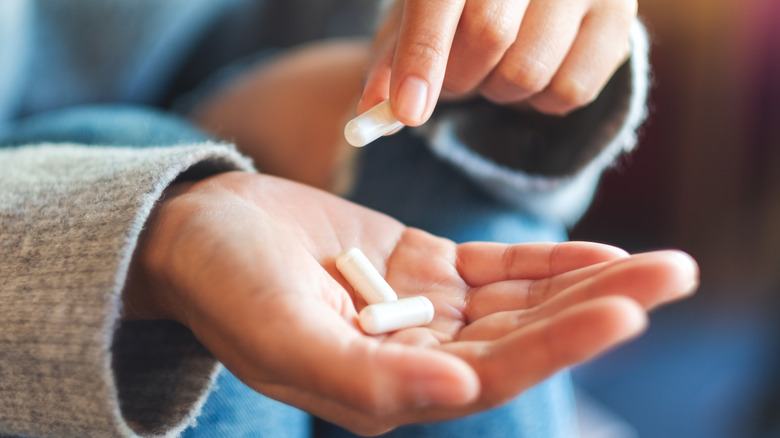
Farknot Architect/Shutterstock
Treatment for postpartum depression varies across different individuals depending on the form and severity of their symptoms. Some women can benefit from anti-anxiety or antidepressant medication, but it’s important for each individual to sift through her options with a healthcare provider, particularly if she’s breastfeeding (via International Journal of Women’s Health). Research shows that women who’ve previously battled depression tend to prefer antidepressants to psychotherapy, whereas breastfeeding women usually opt for psychotherapy (via Expert Opinion on Pharmacotherapy). Studies also support the effectiveness of a combination of medication and psychotherapy.
The standard antidepressants that women are given are selective serotonin reuptake inhibitors (SSRIs) like fluoxetine, paroxetine, and sertraline, once it’s been established that the proper diagnosis isn’t bipolar disorder. A review study from the Journal of Affective Disorders found that women receiving SSRIs experienced a 87.5% reduction in depressive symptoms and up to 65% complete symptom remission. Another study saw improvements in both postpartum depression and anxiety when women received either SSRI antidepressants or SSRIs plus CBT for 12 weeks.
SSRIs work by increasing the brain’s available levels of serotonin, a chemical messenger that regulates mood (via Mayo Clinic). However, based on the understanding that serotonin isn’t a major player in the condition and that low levels of GABA may be involved in depression, scientists have developed new medication that increases the steroid allopregnanolone, in turn, working on the brain’s GABA receptors (via Neurobiology of Stress).
Supplementation for the treatment of postpartum depression
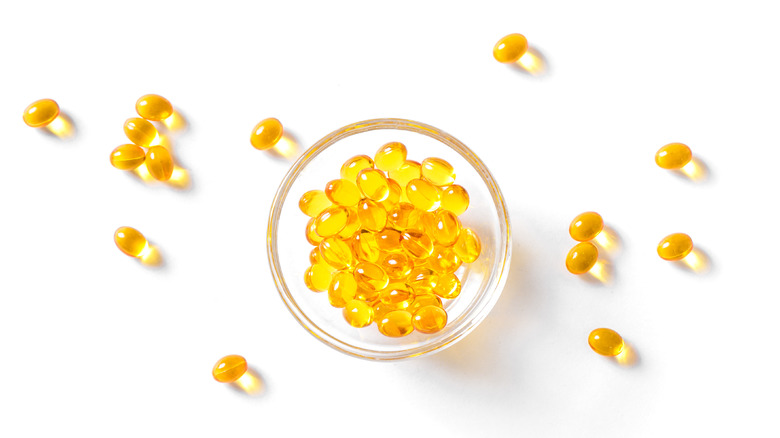
Oksana Mizina/Shutterstock
A consistent body of research evidence supports the use of omega-3 fatty acid supplementation for the treatment of postpartum depression (via Expert Opinion on Pharmacotherapy). It’s one of the only alternative pharmacological treatments that’s been extensively studied due to its ability to dampen or prevent inflammation, which is believed to be a key contributor to the condition. After all, omega-3 fatty acids such as eicosapentaenoic acid (EPA) and docosa-hexaenoic acid (DHA) are vital for the development of the baby’s central nervous system (via International Journal of Women’s Health). These nutrients are transferred from the mother to the fetus during pregnancy, causing the pregnant woman to become depleted and putting her at a higher risk of depression. Modern western diets are loaded with omega–6 but tend to be relatively deficient in omega–3 fatty acids compared to ancestral diets, point out researchers (via Current Directions in Psychological Science).
A meta-analysis of 29 randomized controlled trials investigated the possible link between low levels of omega-3 and postpartum depression, demonstrating that omega-3 fatty acid supplementation was helpful in staving off depression for some people (via The American Journal of Clinical Nutrition). Another study from the journal PLoS One found that a low omega-3 index in late pregnancy correlated with higher depression scores at three months postpartum. It appears that omega-3 fatty acids may have therapeutic effects for postpartum depression, but more research is needed to explore this relationship (via International Journal of Women’s Health).
Exercise and meditation

PH888/Shutterstock
It’s long been known that exercise can induce antidepressant effects, and evidence suggests that it may also alleviate symptoms of postpartum depression. A study from the Journal of Midwifery & Women’s Health highlighted the therapeutic benefits of exercise for postpartum women. Pram walking in particular is a simple way for women to get outside and move their bodies. On the whole, postpartum exercise interventions have been found to reduce depressive symptoms and lower the chances of remission in patients with postpartum depression, according to research published in the journal Evidence-Based Practice. Many women have vouched for the positive effects of participating in exercise programs as an adjunctive treatment for depression, including aerobic exercise, gentle flow yoga, whole body stretching, and resistance training. Research even brings light to the efficacy of “home-based exercise” as a nonpharmacological intervention for postpartum depressive symptoms (via Journal of Psychosomatic Obstetrics & Gynecology).
Mindfulness training can also serve as a useful tool to help postpartum women cope with feelings of stress by calming and centering their minds. Based on data yielded by a 2024 study from the journal Electronic Physician, mindfulness training has the potential to considerably lessen depressive symptomatology in women with newborn babies, and can even be used as an alternative to psychiatric treatment.
The importance of social networks

Dragana Gordic/Shutterstock
When a woman receives social support during pregnancy and after birth, she’s less likely to be plagued by postpartum depression (via BMC Pregnancy and Childbirth). Social support is defined as a “voluntary act from one individual (the donor) that is given to another individual (the recipient), which elicits an immediate or delayed positive response in the recipient”. Studies have shown that having a larger network of supportive people throughout pregnancy has a protective role against depression when a woman feels satisfied with the support she receives.
Telephone-based peer support is another effective treatment and preventative intervention for women coping with postpartum depression. A study from The BMJ revealed that phone calls from women who previously struggled with postpartum depression helped prevent depressive symptomatology among new mothers. These findings lend support to the idea that lay people who have overcome similar mental health issues may serve as a valuable resource in recovery for people dealing with postpartum mental health issues.
It can be helpful for women to step out of isolation, whether that means reaching out to friends, family, or peers rather than tackling symptoms of depression or anxiety alone. If you don’t feel comfortable speaking to someone you know, you can also find various online support groups, forums, and helplines via the website Postpartum Support International. These services are facilitated by trained professionals who can connect you with other helpful tools and resources.

